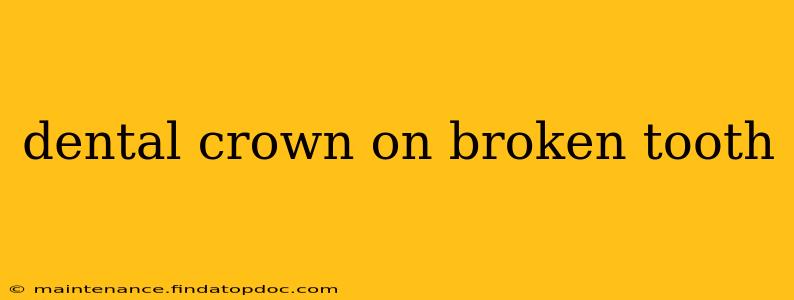A broken tooth can be a painful and unsettling experience, but thankfully, modern dentistry offers effective solutions. One of the most common and reliable methods for restoring a severely damaged tooth is placing a dental crown. This comprehensive guide will explore everything you need to know about dental crowns for broken teeth, addressing common questions and concerns.
What is a Dental Crown?
A dental crown is a tooth-shaped cap that's placed over a damaged tooth to restore its shape, size, strength, and appearance. Think of it as a protective "cap" that covers the entire visible portion of the tooth above the gum line. Crowns are crafted from durable materials like porcelain, ceramic, metal (gold, alloys), or a combination thereof, depending on the individual needs and the location of the tooth within the mouth. They're designed to seamlessly blend with your natural teeth, ensuring a natural-looking smile.
When is a Crown Necessary for a Broken Tooth?
A crown is typically recommended when a tooth is significantly damaged and other restorative treatments, like fillings, are insufficient. This includes situations where:
- The tooth is severely fractured: Large chips or cracks that compromise the tooth's structural integrity often require a crown.
- The tooth has extensive decay: When decay is too extensive for a filling, a crown provides better protection and support.
- The tooth is weakened after root canal treatment: Following a root canal, the tooth becomes more brittle and prone to fracturing, making a crown essential for long-term stability.
- The tooth is discolored or misshapen: Crowns can improve the cosmetic appearance of teeth that are stained, chipped, or oddly shaped.
What are the Different Types of Dental Crowns?
Several types of crowns cater to diverse needs and preferences:
- Porcelain Crowns: These are aesthetically pleasing, matching the natural color of your teeth, and highly durable. They are ideal for visible teeth.
- Ceramic Crowns: Similar to porcelain, these offer excellent aesthetics and strength, making them suitable for both front and back teeth.
- Metal Crowns: These are extremely strong and durable, often used for molars that withstand significant biting forces. However, they are less aesthetically pleasing.
- Porcelain-Fused-to-Metal (PFM) Crowns: Combining the strength of metal with the aesthetic appeal of porcelain, these crowns offer a balance of durability and appearance.
How is a Dental Crown Placed?
The process generally involves two appointments:
- Preparation: The dentist will prepare the tooth by removing a small amount of enamel to create space for the crown. An impression of the prepared tooth is taken to create a custom-fitted crown in a dental lab. A temporary crown will be placed to protect the tooth until the permanent crown is ready.
- Placement: At the second appointment, the temporary crown is removed, and the permanent crown is cemented into place. The dentist will ensure a proper fit and bite.
How Long Do Dental Crowns Last?
With proper care, a dental crown can last for 10-15 years or even longer. Regular dental checkups and good oral hygiene practices are crucial for maximizing the lifespan of your crown.
What are the Risks and Complications Associated with Dental Crowns?
While generally safe, there are potential complications, such as:
- Irritation or inflammation of the gums: This is usually temporary and can be managed with proper oral hygiene.
- Fractured crown: This can occur due to trauma or excessive biting forces.
- Allergic reaction to the material: This is rare but possible, especially with metal crowns.
How Much Does a Dental Crown Cost?
The cost of a dental crown varies depending on factors such as the type of crown, the dentist's fees, and your insurance coverage. It's best to contact your dentist or insurance provider for a more accurate estimate.
Can I Get a Crown on a Baby Tooth?
No, crowns are typically not placed on baby teeth unless there's a specific clinical need, as the baby teeth will eventually fall out. Treatment for a broken baby tooth might involve a stainless steel crown or other temporary measures.
How Do I Care for a Dental Crown?
Maintaining good oral hygiene is essential. Brush twice a day with fluoride toothpaste, floss daily, and use mouthwash as recommended by your dentist. Avoid biting hard objects to prevent damage to the crown.
By understanding the process, benefits, and potential complications, you can make an informed decision regarding dental crown treatment for your broken tooth, leading to a healthy, functional, and beautiful smile. Remember to consult with your dentist to determine the best course of action for your specific situation.
